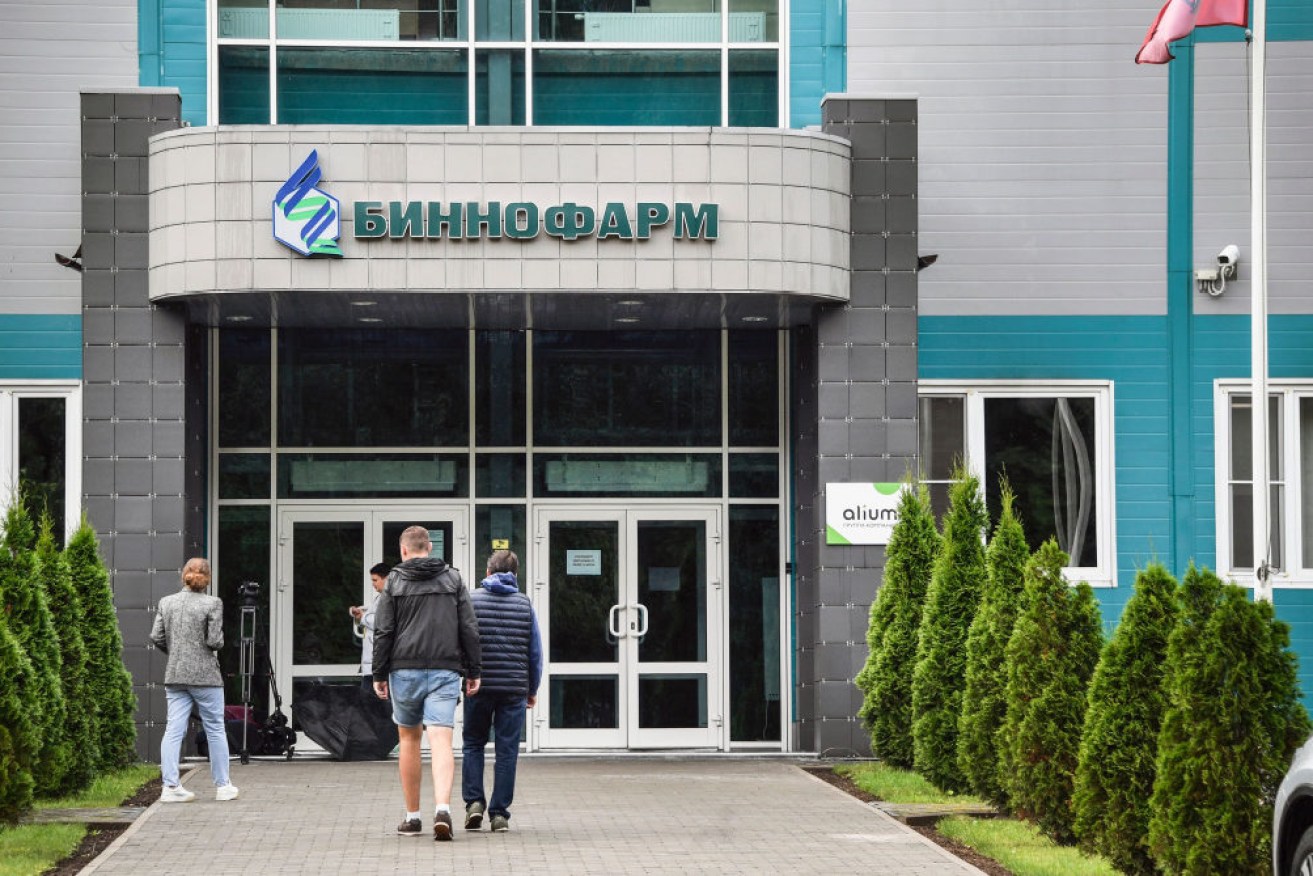Russia says experts with ‘groundless’ coronavirus vaccine safety concerns are just jealous


A view of pharmaceutical factory Binnofarm in the town of Zelenograd outside Moscow, where Russia is starting to produce an anti-coronavirus vaccine. Photo: Getty
Russia has rejected claims that its coronavirus vaccine is unsafe and “groundless” and vowed to roll it out in two weeks.
Moscow-based business conglomerate Sistema is pushing ahead with what it claims is the world’s first COVID-19 vaccine despite scientists – including those from Australia, Germany, the US and the UK – raising alarm bells.
The vaccine, dubbed “Sputnik V”, was this week given regulatory approval by Russia’s Health Ministry.
But the fact it has not yet completed its final trials has experts querying the wisdom of approving the vaccine before testing is complete.
The country’s Health Minister Mikhail Murashko has dismissed the concerns, saying foreign experts who have a problem with the vaccine being rolled out are just jealous.
“It seems our foreign colleagues are sensing the specific competitive advantages of the Russian drug and are trying to express opinions that in our opinion are completely groundless,” Mr Murashko said.
Not everyone outside Russia is worried. The New York Times is reporting that Paraná, a state of Brazil, has reached a deal with Russia about supplying the vaccine to its citizens. But the state was concerned it would not get approved by the federal government.
The state press office said the head of the Parana Technology Institute (Tecpar) would host a news conference to discuss the memorandum of understanding with Russia on Thursday morning (Australian time).
Brazil has the world’s worst coronavirus outbreak outside of the US, with the latest Johns Hopkins University data showing more than 3.1 million people in Brazil have COVID-19 while 103,026 people have died.
Experts express concern
Australian health officials admit they know “very little” about Moscow’s alleged breakthrough so far, and are waiting for more independent data before passing judgement.
Deputy Chief Medical Officer Nick Coatsworth said on Wednesday he was “constantly astonished by the speed and the pace with which the global community is racing towards finding effective vaccines and treatments for COVID”.
Only about 10 per cent of clinical trials are successful and some scientists fear Moscow may be putting national prestige before safety.
President Vladimir Putin has claimed the vaccine “passed all the needed checks”, adding that he’s so confident that even his own daughter has had the jab.
However, despite the bold assertions from Moscow, the Russian vaccine has not yet gone to a “phase-three” trial, and some citizens said they were too scared to try the vaccine when it is rolled out.
Some people fear they would not have a say in whether to have the jab when it becomes available.
“I’m a teacher and they’ll recommend we get it,” Moscow resident Irina Fashchevskaya told AAP. “We’ll be forced to do it.”
The Moscow-based Association of Clinical Trials Organizations (ACTO) had urged the health ministry to postpone the vaccine’s approval until the final trial had been completed.
“It’s the ambition, the desire to be first in a field in which, unfortunately, Russia cannot vie for a top spot,” executive director Svetlana Zavidova told Reuters.
“Our task is now to warn the population because we so far don’t understand how they (the authorities) are going to carry out mass vaccination.”

Russia has developed the first vaccine offering “sustainable immunity” against the coronavirus, President Vladimir Putin announced on August 11. Photo: Getty
Officials have said that the vaccine would be administered to people, including doctors, on a voluntary basis in the final trial.
Mass roll-out in Russia is expected to start in October.
Meanwhile, Australia’s top medical officers are increasingly confident a coronavirus vaccine will be found but remain circumspect about locking in a timetable.
Dr Coatsworth said he was in touch with Australian researchers and experts hunting for a precious vaccine.
“We are everyday becoming more and more optimistic – cautiously optimistic – but optimistic nonetheless of a COVID-19 vaccine being produced,” he told reporters in Canberra on Wednesday.
CSIRO chief scientist Larry Marshall is also optimistic a vaccine will be discovered.
But he was tight-lipped about when the public could expect a coronavirus jab.
“I’m not allowed to answer that question,” Dr Marshall told the National Press Club.
-with AAP








